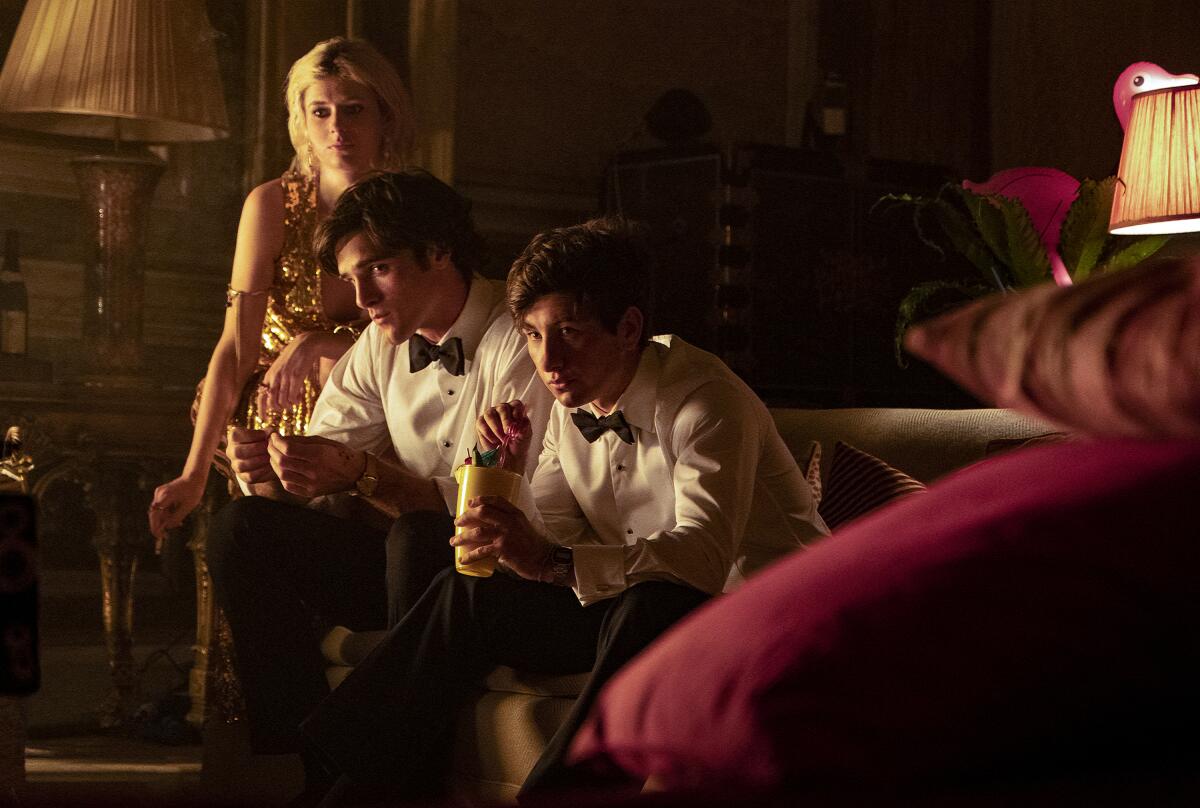Review: ‘Saltburn’ lays out a rich spread of class envy as one vulture swoops in to feed

- Share via
Goodness, do we spend “Saltburn” trying to hate Jacob Elordi’s Felix Catton, the aristocratic heir to a British estate from which the film takes its name. This is a coldblooded heart-clencher about inequality and Felix tips the scales as the college boy who has everything. He’s 6 foot 5, irresistibly attractive and inconceivably wealthy. At the University of Oxford, where Emerald Fennell’s kinky psychodrama begins, he lounges confidently at the center of the social circle. Not just the bull’s-eye, but the invisible dot in the middle of the bull’s-eye that’s only big enough for him.
Worse, Felix is nice. Self-effacingly and almost sacrificially nice, except that the kindnesses he bestows upon his latest pity project, a scholarship student named Oliver Quick (Barry Keoghan), spring from such boundless good fortune that they don’t cost him a thing. Felix’s only flaw is that he’s aware he’s exceptional, even compared to his popular American-born cousin Farleigh (Archie Madekwe, fantastic) and his emotionally wobbly sister Venetia (Alison Oliver). But to resent Felix for knowing that he’s tall, handsome and rich is like scolding the ocean for admitting it’s wet. And that Fennell has set her marvelously wicked story in 2006 — a decade before “check your privilege” became a refrain as common as “gesundheit” — makes Felix’s early-onset empathy extraordinary. It was only the year before that today’s crowned scion of sensitivity, Prince Harry, went to a costume party dressed like a Nazi.
“I loved him, I loved him, I loved him,” Oliver chants in an opening voice-over. He doesn’t have to try hard to convince us. The audience naturally aligns with the outsider looking in, and Keoghan’s geek is forever peering through windows with mole-ish envy. Oliver has arrived at Oxford expecting, naively, an intellectual meritocracy. He assumes a lad with his smarts and his cheekily literary name will be able to prove that he belongs. But 21st-century Oxford isn’t like the historical novels we imagine, even Evelyn Waugh’s class-conscious, homoerotic “Brideshead Revisited,” clearly a touchstone. As proof, Fennell (Oxford, Class of ‘07) starts the film with a staggering tracking shot through a campus populated with all sorts of prepster variations: boho, pastel goth, Elle Woods wannabes, even a girl clutching a five-foot stuffed flamingo.
Alas, Oliver is shunned until he squeezes under Felix’s protective wing. He’s grateful for the friendship and humiliated by the power imbalance. Fennell is fascinated by their dynamic. You can tell it’s one she knows, being a girl who grew up with Elton John as family friend (which sounds glamorous, but is still several rungs below actually being Elton John). Like in her polarizing and incisive debut “Promising Young Woman,” she explores a problem with no intention of solving it, a goal that makes her closer to pranksters like Luis Buñuel than to today’s moralists who want films to dole out judgments and resolutions. Fennell just likes studying the points of pressure that make people snap, and she finds plenty when Oliver is invited to summer at Saltburn where, at the first family breakfast, he finds himself apologizing three times over his eggs.

Saltburn! A mansion so grand that the composer Anthony Willis pairs the first glimpse of it with a tizzy of violins. Grounds so vast and impressively maintained that neither we nor the Cattons bother to memorize any of the servants’ faces, save for one intimidating butler (Paul Rhys). “The turnover of a footman is notoriously high!” Felix groans.
The film was shot at Drayton House, a baroque palace constructed sometime after the Norman Conquest, and appears to make use of the original decor, plus the home’s own history of scandals, family feuds and beheadings. After racing through the rooms on a deadpan tour — Henry VII’s cabinet, Shakespeare’s folios, some “hideous Reubens” — Felix presents the rest of the residents: his parents, Sir James and Elspeth (Richard E. Grant and Rosamund Pike), and Poor Dear Pamela (Carey Mulligan), his mother’s own human foster pet. Mulligan, her hair a frightful shade of red, seems to have allowed the makeup team to draw extra furrows between her eyebrows: the look of a cash-strapped grande dame paranoid that she’s outstayed her welcome in Paradise. Not that Pike’s Elspeth, a blithe and gossipy ex-model (and a contender for funniest zingers of the year), would say so to her face. Elspeth only insults Pamela when she’s out of the room.
Fennell has an ear for cadence, and her editor, Victoria Boydell, has impeccable shock-comic timing. The film is put together with precision, from the spot-on needle-drops (MGMT, Pet Shop Boys, Sophie Ellis Bextor) to the yellow LiveStrong bracelet on Felix’s wrist (the symbol of clueless mid-aughts do-gooder-ism). The cinematographer Linus Sandgren can make two people whispering at a karaoke party feel as intimate as if they were under the sheets, and then, scenes later, hit us with a visual wallop, like a whole room suddenly bathed in blood red.

But the film also promises transgressive sex and delivers it in bathtubs, graveyards, misty evenings in the garden and silhouetted pouncings at midnight. These encounters are nerve-racking, not romantic. They make you hold your breath. Narratively, it’s impossible to buy that the erotically charged nighttime Oliver is the same dweeb we see in the day (what is he, a sexual werewolf?), but it’s worth sacrificing character consistency for the fun of seeing Oliver bring the rich to heel. On the flip side, we also never believe that hapless Oliver would have those pecs.
None of this is an insult to Keoghan, who, in movie after movie, is such a consistently bizarre and watchable screen presence that we risk taking him for granted. Here, with his dopey expressions fused to a satyr’s body, he makes you nervous the way Malcolm McDowell did after he was reformed in “A Clockwork Orange.” You can’t tell whether this out-of-his-league loser is scheming a brilliant revenge or if he’s just drunk on the Cattons’ champagne and no brighter than a cartoon bird laying dynamite for a cat. “It was impossible not to love Felix,” his Oliver insists. But he’s determined to try — and to make us forgive him if he succeeds.
'Saltburn'
Rated: R, for strong sexual content, graphic nudity, language throughout, some disturbing violent content and drug use
Running time: 2 hours, 7 minutes
Playing: Now in limited release
More to Read
Only good movies
Get the Indie Focus newsletter, Mark Olsen's weekly guide to the world of cinema.
You may occasionally receive promotional content from the Los Angeles Times.









